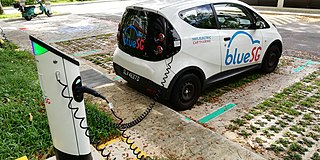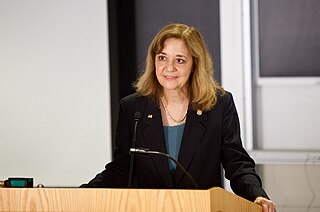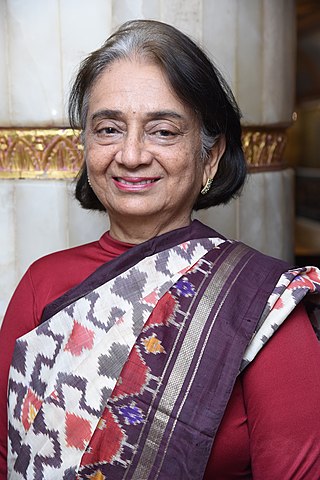Related Research Articles

Natural resources are resources that are drawn from nature and used with few modifications. This includes the sources of valued characteristics such as commercial and industrial use, aesthetic value, scientific interest, and cultural value. On Earth, it includes sunlight, atmosphere, water, land, all minerals along with all vegetation, and wildlife.

The United Nations Environment Programme (UNEP) is responsible for coordinating responses to environmental issues within the United Nations system. It was established by Maurice Strong, its first director, after the United Nations Conference on the Human Environment in Stockholm in June 1972. Its mandate is to provide leadership, deliver science and develop solutions on a wide range of issues, including climate change, the management of marine and terrestrial ecosystems, and green economic development. The organization also develops international environmental agreements; publishes and promotes environmental science and helps national governments achieve environmental targets.

The Global Environment Facility (GEF) is a multilateral environmental fund that provides grants and blended finance for projects related to biodiversity, climate change, international waters, land degradation, persistent organic pollutants (POPs), mercury, sustainable forest management, food security, and sustainable cities in developing countries and countries with economies in transition. It is the largest source of multilateral funding for biodiversity globally and distributes more than $1 billion a year on average to address inter-related environmental challenges.
A green economy is an economy that aims at reducing environmental risks and ecological scarcities, and that aims for sustainable development without degrading the environment. It is closely related with ecological economics, but has a more politically applied focus. The 2011 UNEP Green Economy Report argues "that to be green, an economy must not only be efficient, but also fair. Fairness implies recognizing global and country level equity dimensions, particularly in assuring a Just Transition to an economy that is low-carbon, resource efficient, and socially inclusive."

Environmental technology (envirotech) is the use of engineering and technological approaches to understand and address issues that affect the environment with the aim of fostering environmental improvement. It involves the application of science and technology in the process of addressing environmental challenges through environmental conservation and the mitigation of human impact to the environment.

Clean technology, also called cleantech or climatetech, is any process, product, or service that reduces negative environmental impacts through significant energy efficiency improvements, the sustainable use of resources, or environmental protection activities. Clean technology includes a broad range of technology related to recycling, renewable energy, information technology, green transportation, electric motors, green chemistry, lighting, grey water, and more. Environmental finance is a method by which new clean technology projects can obtain financing through the generation of carbon credits. A project that is developed with concern for climate change mitigation is also known as a carbon project.

The United Nations Environment Programme (UNEP) established Champions of the Earth in 2005 as an annual awards programme to recognize outstanding environmental leaders from the public and private sectors and from civil society.

In developing countries and some areas of more developed countries, energy poverty is lack of access to modern energy services in the home. In 2022, 759 million people lacked access to consistent electricity and 2.6 billion people used dangerous and inefficient cooking systems. Their well-being is negatively affected by very low consumption of energy, use of dirty or polluting fuels, and excessive time spent collecting fuel to meet basic needs.

Rosina M. Bierbaum is currently the Roy F. Westin Chair in Natural Economics and Research Professor at the University of Maryland's School of Public Policy. She is also a professor and former dean at the University of Michigan School of Natural Resources and Environment (SNRE). She was hired in October 2001, by then-University of Michigan President, Lee Bollinger. She is also the current Chair of The Scientific and Technical Advisory Panel (STAP) that provides independent scientific and technical advice to the GEF on its policies, strategies, programs, and projects.

Mohamed Hag Ali Hag el HassanOMRI GCONMC FAAS FIAS FTWAS is a Sudanese-Italian mathematician and physicist who co-founded numerous scientific councils. He is the President of The World Academy of Sciences and Sudanese National Academy of Sciences.

Jyoti Kirit Parikh is the current Executive Director of Integrated Research and Action for Development (IRADe). She was a Member of the Prime Minister’s Council on Climate Change –India and is a recipient of Nobel Peace Prize awarded To IPCC authors in 2007. She was a Senior Professor at Indira Gandhi Institute of Development Research (IGIDR), Mumbai. She also worked at the International Institute for Applied Systems Analysis (IIASA), Austria and served as a senior energy consultant at the National Institution for Transforming India (1978–80). She was a visiting professor at the Institute of Advanced Studies (IAS) of UNU, Tokyo (1995–96). She was the Acting Director of IGIDR for 1997-98. She has experience for nearly thirty years on energy and environment problems of the developing countries.

Climate finance is an umbrella term for financial resources such as loans, grants, or domestic budget allocations for climate change mitigation, adaptation or resiliency. Finance can come from private and public sources. It can be channeled by various intermediaries such as multilateral development banks or other development agencies. Those agencies are particularly important for the transfer of public resources from developed to developing countries in light of UN Climate Convention obligations that developed countries have.

Jordan has been granted considerate amounts of international aid moneys toward environmental conservation. Foreign aid goes into mitigation projects in the areas of water scarcity, loss of arable land for agriculture, and renewable energy. Moreover, foreign aid goes toward the development of the eco-tourism sector. Jordan receives aid from different kinds of international agents. Principal institutions that donate money toward environmentalism in Jordan are the Global Environmental Facility (GEF), United States Agency for International Development (USAID), and World Bank. Recently, Jordan has had problems to control its budgetary deficit, which directly affects its ability to manage its environmental problems. That has made some point out that Jordan depends on International aid to control environmental-related issues. One of the examples of that is related to the construction of the East Ghor Canal.

The International Renewable Energy Agency (IRENA) is an intergovernmental organization mandated to facilitate cooperation, advance knowledge, and promote the adoption and sustainable use of renewable energy. It is the first international organisation to focus exclusively on renewable energy, addressing needs in both industrialised and developing countries. It was founded in 2009 and its statute entered into force on 8 July 2010. The agency is headquartered in Masdar City, Abu Dhabi. The Director-General of IRENA is Francesco La Camera, a national of Italy. IRENA is an official United Nations observer.

The contributions of women in climate change have received increasing attention in the early 21st century. Feedback from women and the issues faced by women have been described as "imperative" by the United Nations and "critical" by the Population Reference Bureau. A report by the World Health Organization concluded that incorporating gender-based analysis would "provide more effective climate change mitigation and adaptation."
Waste management in Kazakhstan is an important concern within the country, considering the billions of tons of industrial waste produced yearly, the currently less-than-optimal state of solid waste management, and existing toxins remaining from both pollutants and Kazakhstan's historical position as the USSR's testing grounds for rockets and nuclear weapons. Kazakhstan has very few services for recycling solid waste, and waste management is currently dealt with using regional programs.

Robert K. Dixon is an energy, environment, and economic expert at the Office of International Affairs, US Department of Energy headquarters in Washington, DC, USA.

Climate change in Tanzania is affecting the natural environment and residents of Tanzania. Temperatures in Tanzania are rising with a higher likelihood of intense rainfall events and of dry spells.

Climate change in the Middle East and North Africa (MENA) refers to changes in the climate of the MENA region and the subsequent response, adaption and mitigation strategies of countries in the region. In 2018, the MENA region emitted 3.2 billion tonnes of carbon dioxide and produced 8.7% of global greenhouse gas emissions (GHG) despite making up only 6% of the global population. These emissions are mostly from the energy sector, an integral component of many Middle Eastern and North African economies due to the extensive oil and natural gas reserves that are found within the region. The region of Middle East is one of the most vulnerable to climate change. The impacts include increase in drought conditions, aridity, heatwaves and sea level rise.
References
- ↑ "Transcript of oral history interview with Mohamed T. el-Ashry held on May 29 and 30, 2003" (PDF).
- ↑ "United Nations Secretariat to the High Level Panel on System-wide Coherence". www.un.org. Retrieved 2022-11-23.
- 1 2 "El-Ashry Mohamed T. | The AAS". www.aasciences.africa. Archived from the original on 2022-11-23. Retrieved 2022-11-23.
- ↑ "el-Ashry, Mohamed T. | Archives". oralhistory.worldbank.org. Retrieved 2022-11-27.
- ↑ Environment, U. N. (2019-08-22). "Dr. Mohamed El-Ashry". Champions of the Earth (in Spanish). Retrieved 2022-11-27.
- 1 2 3 "Mohamed T. El-Ashry". unfoundation.org. 2022-03-28. Retrieved 2022-11-23.
- ↑ Pollution, United States Congress Senate Committee on Environment and Public Works Subcommittee on Environmental (1977). Federal Water Pollution Control Act Amendments of 1977: Fort Collins, Colo. U.S. Government Printing Office.
- ↑ Duda, Alfred M.; El-Ashry, Mohamed T. (2000-03-01). "Addressing the Global Water and Environment Crises through Integrated Approaches to the Management of Land, Water and Ecological Resources". Water International. 25 (1): 115–126. Bibcode:2000WatIn..25..115D. doi:10.1080/02508060008686803. ISSN 0250-8060. S2CID 56254270.
- ↑ https://www.cabdirect.org/cabdirect/abstract/19901942106.
{{cite web}}: Missing or empty|title=(help) - ↑ Serageldin, Ismail; Martin-Brown, Joan (1999). Partnerships for Global Ecosystem Management: Science, Economics, and Law : Proceedings and Reference Readings from the Fifth Annual World Bank Conference on Environmentally and Socially Sustainable Development, Held at the World Bank and George Washington University, Washington, D.C., October 6-7, 1997. World Bank Publications. ISBN 978-0-8213-4265-7.
- ↑ Notification to EPA of Hazardous Waste Activities: Region 4. U.S. Environmental Protection Agency. 1980.
- ↑ Wolfensohn, James D.; Seligmann, Peter A.; El-Ashry, Mohamed T.; Tribune, International Herald (2000-08-22). "Opinion | How Biodiversity Can Be Preserved if We Get Smart Together". The New York Times. ISSN 0362-4331 . Retrieved 2022-11-27.
- ↑ "The Renewable Energy Era Has Already Started". New Security Beat. 2015-11-05. Retrieved 2022-11-27.
- ↑ El-Ashry, Mohamed T. (2012). "National Policies to Promote Renewable Energy". Daedalus. 141 (2): 105–110. doi: 10.1162/DAED_a_00150 . ISSN 0011-5266. JSTOR 23240283. S2CID 57563534.
- 1 2 3 "Mohamed T. El-Ashry | Leaders | WWF". World Wildlife Fund. Retrieved 2022-11-23.
- ↑ "El-Ashry, Mohamed Taha". TWAS. Retrieved 2022-11-27.
- ↑ "United Nations Secretariat to the High Level Panel on System-wide Coherence". www.un.org. Retrieved 2022-11-27.
- ↑ "Mohamed T. El-Ashry". American Academy of Arts & Sciences. Retrieved 2022-11-27.